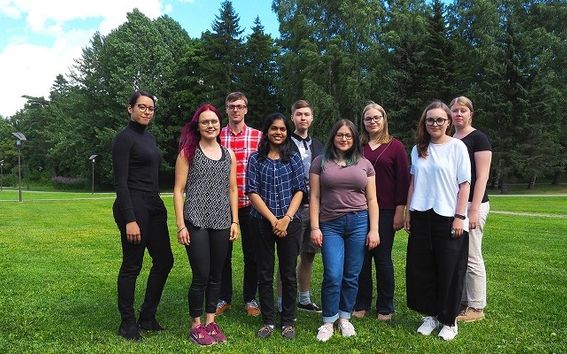Sweaty relief from acne

The team was also nominated to compete for the Best Applied Design prize. This was an excellent achievement in a tough competition for the small student-driven joint team of Aalto University and the University of Helsinki.
International Genetically Engineered Machine (iGEM) is a big annual international competition focused on synthetic biology. This year the competition culminated in a conference held 9-13 November in Boston, with 300 teams from around the world taking part. The multidisciplinary team from Aalto University and the University of Helsinki was Finland's only representative in the competition.
“The Giant Jamboree in Boston was a fantastic experience. Rarely is there an opportunity to meet so many young people interested in science under the same roof”, says iGEM team member Eveliina Karjalainen. “Seeing the other competition projects showed a broad picture of the hot topics of research in synthetic biology”, adds team mate Meo Ekroos.
The research of the Finnish iGEM team focused on the resistance of bacteria against antibiotics and related problems. The team put a special focus on the antimicrobial dermcidin molecules, which can be found in human perspiration, and their use in the treatment and prevention of acne. Acne afflicts 85 percent of young people and adults aged 11 to 30, and it can have harmful social and psychological effects. Severe cases of acne have been found to correlate with a low level of dermcidin molecules. This means that products containing dermcidin could provide a natural treatment for acne. In addition to laboratory work the team has conducted product development and consumer and expert research, and has tried to expand overall knowledge of synthetic biology.
The team is brainstorming their reseachr topic, the resistance of bacteria against antibiotics, early spring 2017. (Photo: Aalto-Helsinki iGEM 2017)
Effective results through cooperation and versatile know-how
The 9-member team from Finland was more multidisciplinary than ever before, combining design, clothing and textile design, graphic design, machine design, biotechnology, chemistry, mathematics, biology, genetics, medicine, and bio-IT.
“Although the competition demands much work it is definitely worth it. In the course of studies it is not often possible to engage in similar projects from beginning to end, and it has taught us a great deal”, says Eveliina Karjalainen. Meo Ekroos agrees: “The iGEM project is immeasurably valuable. It allows participants to visualise larger wholes than can be done in connection with studies”.
Applications for the 2018 iGEM team accepted in November-December
Applications for a multidisciplinary team for next year's iGEM are being taken soon. The event involves much more than mere synthetic biology. Members of the 2017 team emphasise that applications for the team are welcomed even from those who are not familiar with synthetic biology, or even biology, the most important aspect is interest in multidisciplinary work. Teams in the competition include philosophers, coders, engineers, designers, as well as students of business and science, among others.
Those taking part in an iGEM team get to develop their teamwork and problem-solving skills as well as innovativeness These skills are also needed at work. “This is a way to learn about the entire life cycle of a research project”, adds iGEM-team member Meryem Ecem Kaya. Applications for membership in the new team are being taken as of November-December. Check the team's Facebook page and apply to join!
Read more about the research of the Finnish iGEM team, 2017.
Read more news

Stop applying for jobs and build your own startup instead at Ignite
Applications for the Ignite summer accelerator program 2026 are open. Apply by March 8.Soil Laboratory Exhibition – Exploring the Dialogue Between Human and the Earth in Utsjoki
Soil Laboratory explores the relationship between humans and the earth as a living landscape through ceramic practices in Utsjoki.
The Finnish Cultural Foundation awarded grants for science and art
A total of 15 individuals or groups from Aalto University received grants






